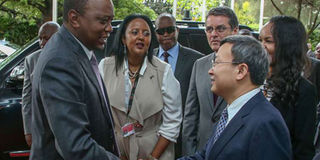Deeper Sino-Kenya investment best bet for sustainable growth

President Uhuru Kenyatta with China's Vice Minister of Commerce, Wang Shouwen, during the High Level Segment of the 4th China Round Table in Nairobi. PHOTO | FILE | NATION MEDIA GROUP
What you need to know:
China accounts for a quarter of Kenya’s import bill and an FTA could deepen our dependence on Chinese imports.
Over the past five years, Chinese exports to Kenya have more than doubled while the reverse remained low and stagnant.
What China hopes to achieve through the FTA is diametrically opposed to President Uhuru Kenyatta’s ‘Big Four’ agenda.
Kenya has expressed its discomfort with a comprehensive free trade agreement (FTA) that China has been negotiating with the East African Community since 2016 which would give preferential access to goods imported from the Dragon economy.
The source of tension is clear: Dr Chris Kiptoo, the principal secretary for Trade, was quoted in the Business Daily as lamenting that local manufacturers risked being over-run by Chinese firms if the FTA is ratified.
China accounts for a quarter of Kenya’s import bill and an FTA could deepen our dependence on Chinese imports.
Over the past five years, Chinese exports to Kenya have more than doubled while the reverse remained low and stagnant. Between 2013 and 2017, China’s shipments to Kenya more than doubled to Sh390.6 billion from Sh182 billion, according to the ‘2018 Economic Survey’, as the value of Kenya’s exports to the East Asian country increased marginally to just under Sh10 billion.
TRADE DEFICIT
The huge trade deficit in favour of China and the rising share, in value terms, of Chinese goods in Kenya’s import basket is a wake-up call for the government to be more hawkish when negotiating deals with its more developed trading partners.
The biggest dilemma Kenya faces is, as China seeks to deepen its access to the Kenyan market, Nairobi has embarked on an ambitious programme to grow its manufacturing sector — the engine of economic growth and job creation for the burgeoning youth population.
What China hopes to achieve through the FTA is diametrically opposed to President Uhuru Kenyatta’s ‘Big Four’ agenda. Increased market access for Chinese products would pose serious competition for local goods and stifle the recovery of the Big Four’s manufacturing pillar — whose contribution to national output remains below 10 per cent but is expected to double by 2022.
POWERFUL TRADING NATION
China has become an all-powerful trading nation, shaking even global powerhouses, including the United States. It has also rapidly advanced in manufacturing and technology, offering high-quality and more competitively priced products on a scale unseen before in the global marketplace.
Essentially, Kenya is unlikely to withstand the immense power of China in trade, spiced with public investment deals such as the standard gauge railway that create opportunities to modernise the economy and improve its efficiency.
The best option for Kenya and China would be to negotiate a trade and investment deal that converges their mutual interests. The pact would be focused on expanding Chinese investments in Kenya’s manufacturing sector to stimulate economic growth, job opportunities and upgrading of skills to improve labour productivity.
The impact of Chinese capital should be felt more in large-scale manufacturing, rather than in agriculture, construction, real estate and finance, where most of the 400 Chinese firms are concentrated. Kenya should explore opportunities for the Chinese to set up subsidiaries and manufacturing operations locally for the most commonly traded goods.
COMMON MARKET
China should consider such investment as a springboard to the EAC market and to the more expansive Common Market for Eastern and Southern Africa (Comesa) trade zone.
In the meantime, Kenya should increase value-added exports to China to raise its export earnings and reduce heavy dependence on raw commodities that fetch poor, unreliable returns. It should also protect local manufacturers from counterfeits and dumping.
While Kenya has a lot to learn from China’s success, that model would only be relevant if it helps Kenyans to resolve their development crisis.
It would be a tragedy if the trade relations turned into an opportunity for China to exert more influence and control over Kenya’s external trade basket.
Mr Warutere is a director of Mashariki Communications Ltd. [email protected]





